#all heroes...are bound to become the villain (ow edge)
Explore tagged Tumblr posts
Text
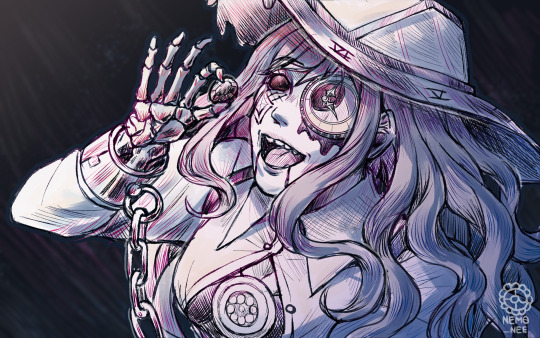
𝐓𝐈𝐌𝐄 𝐞𝐚𝐭𝐬 𝐚𝐥𝐥 𝐡𝐢𝐬 𝐜𝐡𝐢𝐥𝐝𝐫𝐞𝐧 𝐢𝐧 𝐓𝐇𝐄 𝐄𝐍𝐃.
bskfsfksfs Overblot Mayuu concept... Inspired by a certain titan with a monstrous appetite?! Yeah, don't eat blotted magestones kids-
A certain housewarden is FUCKED (iykyk)
I just needed to get this idea out of my system, might render when I'm feeling ambitious
#twst oc#twst#twisted wonderland oc#twisted wonderland#twst overblot#twst yuu#twst mc#kairyn saint#mayuu#my art heh#[incoming ramble ->]#did i really decide to do this over my art project? y e s#why? because I am in misery /j#BUT REALLY- OB MAYUU HAS BEEN ROTTING IN MY BRAIN FOR WEEKS#yuus can't OB because they're magicless... but mayuu? girl... that's a part of the kyuu special#all heroes...are bound to become the villain (ow edge)#it just happens that when you try to prevent every necessary disaster to the plot... you make things harder for yourself later-#she'll be fine (not really)#anyway back to the drawing board i go o-(-(
227 notes
·
View notes
Link
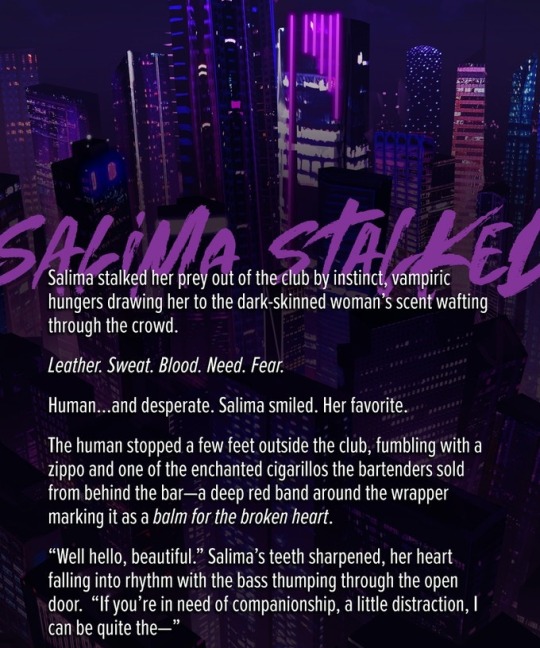

In 2014, Magpie Games launched a Kickstarter for Urban Shadows, an ENnie award-winning tabletop roleplaying game of political urban fantasy that quickly became one of our flagship titles. For years, fans have praised both the game’s effortless explanation of the Powered by the Apocalypse engine and the groundbreaking content on race and urban communities, leading Urban Shadows to be a favorite of urban fantasy gamers, podcasters, and streamers alike.
Now—more than six years later—we are returning to the dark streets of the city for Urban Shadows: Second Edition, updating the game’s rules, look, and tools to better support moving stories of political urban fantasy. Featuring new playbooks, new faction mechanics, and completely revised materials from first edition, Urban Shadows 2E will thrust you into the danger and drama of the city like never before!
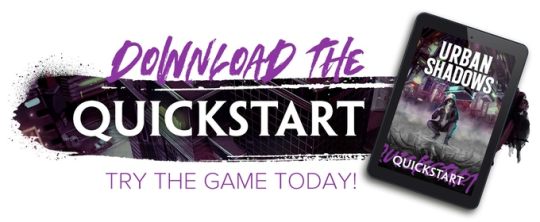
Download the Urban Shadows Quickstart here

Urban Shadows is a political urban fantasy tabletop roleplaying game in which mortals and supernaturals alike vie for power in a modern-day city. Vampires, faeries, hunters, wizards, and more clash in the shadows...or make backroom deals for their piece of the streets and skyscrapers. No one is ever safe, and everything is always at stake.
In Urban Shadows, you play unique and powerful archetypes, protagonists who are attuned to the supernatural world. While the mortal world remains ignorant of the struggles of the city’s supernatural denizens, you are caught in the middle of the physical conflicts and political drama of the city’s past, present, and future.
You might be a spectre bound to an artifact, unable to move on until you’ve resolved your trauma. Or you might be a clever vampire who controls the best blood supply in the city, caught up in a war between your kind and those who hunt you. Or you might be a veteran of your city’s ancient conflicts, someone who got out of the game but keeps getting drawn back in by friends and allies.
No matter who you are, you contain within you the power to shape the city’s destiny. What future will you choose? And what will your victories cost you?
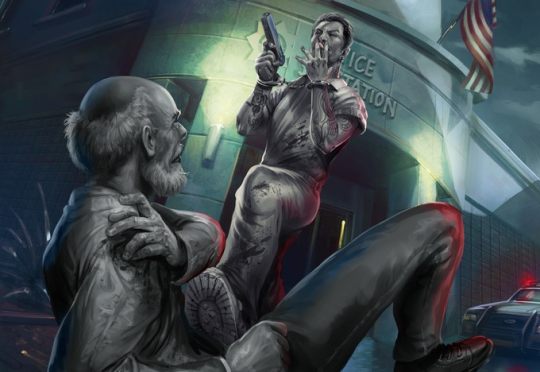
Urban Shadows is based on the Powered by the Apocalypse system used by tabletop RPGs like Apocalypse World, Dungeon World, and many of Magpie Games’s own titles such as Masks: A New Generation, Root: The RPG, and Zombie World. The game uses the core framework of that system to provide a strong, simple way to create your own stories of political urban fantasy. You’ll create a character using one of several archetypes, and then you’ll take action, rolling two six-sided dice to resolve the outcomes of dangerous and difficult situations.
Urban Shadows creates stories like those you’d find in Constantine, Diableros, The Dresden Files, The John Wick franchise, The Last Witchhunter, Lost Girl, and The Wire.

In Urban Shadows, the city is a living, breathing character all its own. It hides dark desires, wicked deeds, and devious schemes, its shadowy tendrils a danger to mortals and supernaturals alike. Some residents have sacred sanctums or secure workshops—places to weather the storms of the city—but a sprawling metropolis lies just outside those little nooks, caring little if you prosper…or bleed out in the gutters.
But nobody faces the city alone. Even the humblest of imps has a small community, a circle of those who can offer solace in the face of problems and danger. But community is a double-edged sword—demanding as much as it gives—and the needs and desires of those same circles constantly shape and reshape the vibrant urban landscape of the city. Nothing lasts forever, but the city turns over nearly every night, different forces laying different claims to you and yours.
The city hungers. Will you sate its gnawing desires? Or will your enemies make you the feast?

The schemes and plots of supernatural beings have been a part of the city for as long as anyone can remember. The faces at the top may shift and change with the tides of fortune, but rarely does something occur in the mortal world without some push from those who lurk in the shadows. A new subway system? A contested election? A bank robbery? Nothing is what it seems.
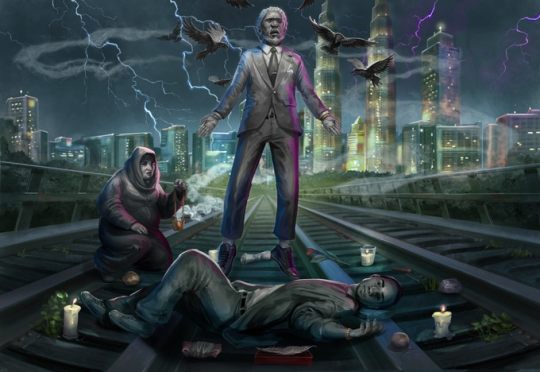
But what is mere money or prestige to wizards, ghosts, and faeries? Who cares about cash or elections when trafficking in human souls or exploring other dimensions? The supernatural forces of the city—and the mortals who deal with them—know only one real currency: debt.
Debt is the power to influence those who owe you, the chits you call in to get things done, the ties that bind you to the rest of the city, and the proof that your word is strong and your bonds unbreakable. There are few true friends in the city, but your debtors always want to see you survive—you can’t pay up if you’re dead.
But there are other ways to triumph in the city beyond the economy of favors and patronage. Cruel rituals. Dark secrets. The temptations of the monster within you. Those who seek power at any cost will find no end to the magics and mysteries available for the merest price of a soul.
The streets bleed shadows—your debtors always around the corner—as the city threatens to swallow you whole. Will you die a hero… or live long enough to become the villain? Will you fight the darkness…or beg for power? The choice is yours.

Over the past five years, Magpie Games has developed and created multiple games that broke boundaries and redefined what PbtA can do. Now, we think it’s time to apply the lessons we’ve learned to Urban Shadows, making a game that’s tighter and easier to run, but also filled with new ideas and improvements, including new tools for players and GMs. We’re also excited to create a beautiful new book with visionary art and fantastic graphic design. In short… we’re making Urban Shadows 2E because we’re thrilled to revisit and refine our work!
Here’s a quick list of the major changes, many of which are already available in the quickstart:
revised basic moves, including new versions of turn to violence and let it out
revised playbooks, including rebuilt versions of The Hunter and The Oracle
two brand new playbooks: The Sworn (Power) and The Imp (Wild)
changing Factions to Circles—see below—and adding Circle Status to represent standing
a new downtime phase of the game focused on player-facing city moves and rumors
replacing Storms with a new MC-facing faction turn, including new faction moves
expanded MC tools for generating your city and Circles at the start of play
We’re also adding a new mechanic to bring PCs into contact more often with each other: City Hubs. Cities are enormous spaces, and we found (in US1E) player characters could sometimes retreat to their different corners of the cityscape, interacting only with their own worlds and not with each other. With City Hubs, we want to create smaller, expandable environments to focus play and create drama. These Hubs—described below—position characters in neighborhoods, institutions, and community spaces in which they interact more frequently and avoid sessions in which PCs rarely come into contact and conflict.
Download the quickstart for a chance to test out some of these new features! We’ll be previewing more of them during the campaign, and we’re excited to get your feedback and refine Urban Shadows even more. Thank you to everyone who has given us feedback on 1st Edition since 2015!

In Urban Shadows, your characters juggle relationships and obligations, seeking allies and opportunities, cashing in debts along the way to get things done. When you seize the day, you reshape the city in your image and unleash your powers on those who stand against you; when your enemies move and hunt, you do your best to stay ahead of the oncoming storm.

Urban Shadows uses the Powered by the Apocalypse framework to resolve interesting moments of uncertainty through moves, bits of mechanics that say: “When you do [x], [y] happens.” Each move trigger—the “When you do [x]” part—is designed to help point at moments of uncertainty, when neither the players nor the GM know exactly what happens next. Some examples of such moments include:
When you throw a punch at a loudmouthed werewolf in a demonic club
When you plead with the wizard’s council to return a tome of magic stolen from you
When you try to escape the evil ritual you stumbled onto in the city’s sewers
When you ask one of your companions to forgive the debt your fae lover owes them
When you trigger a move—when you perform the action described in the move’s trigger—then the rest of the move kicks into effect, often requiring a die roll. You roll 2d6 (two six-sided dice) and add in one of your stats to find out what happens.
Every playbook has four stats:
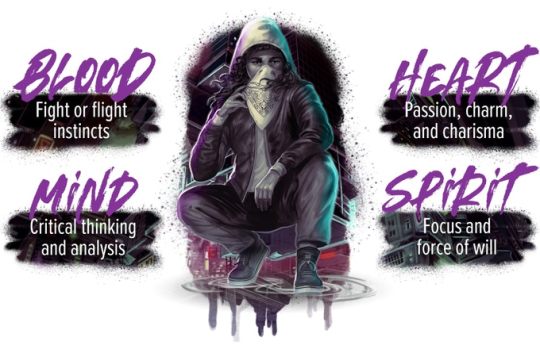
Blood is the measure of your fight or flight instincts. It tells us how tough, dangerous, coiled, and quick to act your character is in a perilous situation.
Heart is the sum of your passion, charm, and charisma. It tells us how proficient your character is at getting what they want through negotiation and persuasion.
Mind is a reflection of your critical thinking and analysis. It tells us how perceptive your character can be and how good they are at manipulating others through deceit.
Spirit is a gauge of your connection to the “other” and your force of will. It tells us how focused your character is under pressure and what kind of power they can unleash.
Each stat is ranked from -3 to +3. You add your stat to some rolls when you trigger certain moves. For example, when you turn to violence, you roll 2d6 + Blood.
On most moves, if you get a 10 or higher (10+), things go your way! If you get a 7-9, you get what you were after, but usually with some cost or complication. If you get a 6 or lower, that’s called a miss, and the GM gets to tell you what happens next as things spiral out of control.
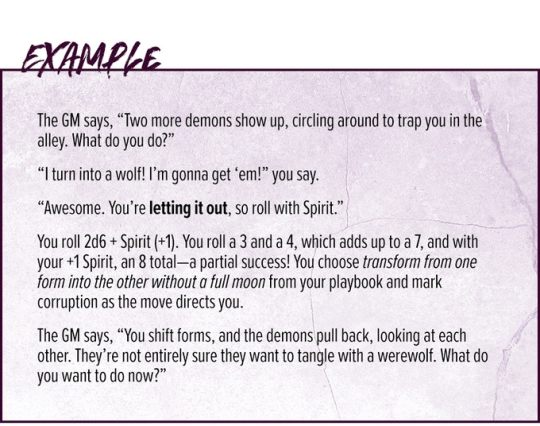
Urban Shadows has basic moves for all the usual conflicts in urban fantasy—fighting, lying, escaping, magic, and more—along with special moves for managing debts and your relationships with communities at large.

The city is a fierce cesspool of politics and corruption, but there are clear connections and boundaries between like-minded residents, spheres of influence that make up the scope of politics within the city. Most call these divisions Circles, loose political groupings that illustrate the differing affiliations and loyalties in the world, each one a community with its own internal politics and dramas. The Circles are:

In addition to the main stats, each character also has ratings (from -3 to +3) for their Circles, measures of how well the character understands each specific community. A character with a high rating in a Circle has contacts and connections within it, and can easily interpret its political information; a character with a low rating in a Circle doesn’t understand how that Circle works or who the power players are within that community.
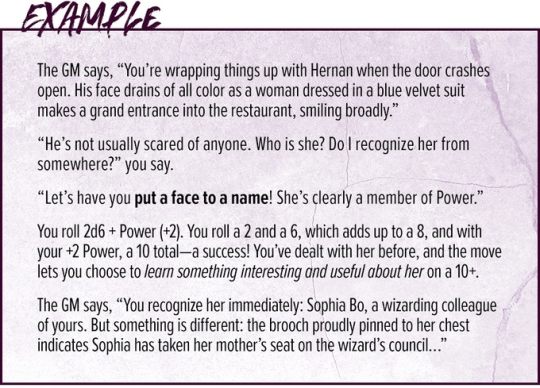
Circles aren’t organizations or formal alliances; they are more like broad communities or subcultures. The disagreement between two members of the same Circle may be as—or more—intense than any conflict between two differing spheres. A werewolf and a vampire both hail from Night, but that doesn’t mean they get along. It only means they understand each other...and the violence inherent in the language of their streets.
Yet there are factions within each Circle capable of acting in unison, alliances who can shape the city’s future—werewolf packs, witch covens, faerie courts, and more. In Urban Shadows: Second Edition, we’re giving GMs new tools to support those factions in a “faction turn” between sessions. We’re also giving players new tools to get stuff done in downtime, acting on the rumors they heard about what the factions have done in the past week or two of offscreen activity, all fueling the drama of the city and the power players have to shape the setting.

Urban Shadows uses archetypes (The Wolf, The Wizard, The Oracle, etc.) to help players create characters quickly and easily. These archetypes are only ever a starting point; you can always bring in different myths, legends, and ideas to make your character entirely your own.
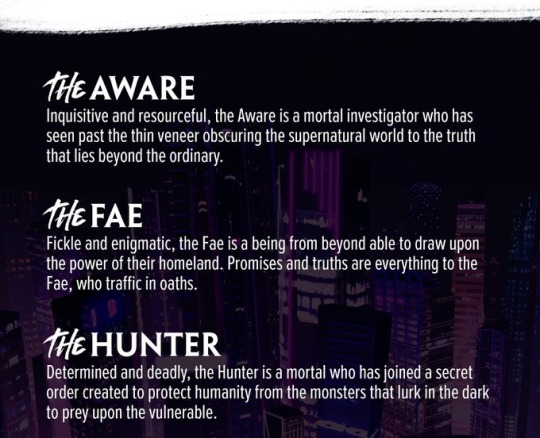
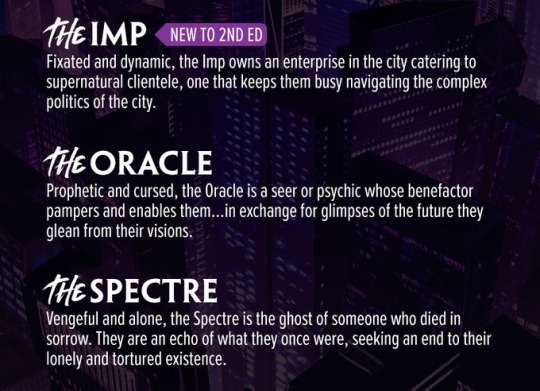
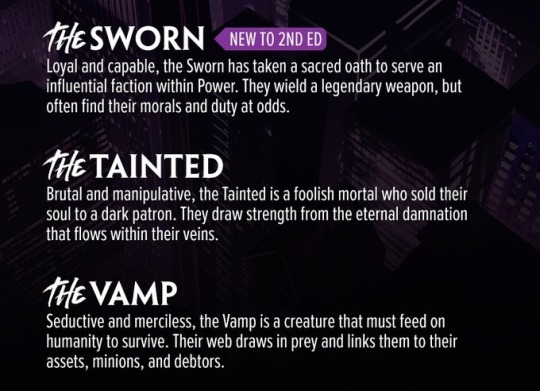
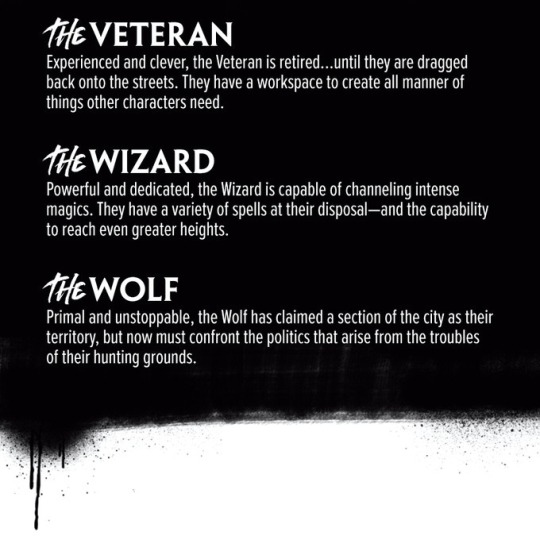
Characters often acquire abilities and powers from other archetypes and may even change archetypes over the course of play. As your character advances, you may also find reasons to retire to safety, securing that character’s place in the city as you create a new character to continue your group's story.

Absolute power...corrupts absolutely. Urban Shadows features a dynamic corruption mechanic, tracking your character's descent into darkness. When you take a life, give in to your monstrous nature, or cross a line you shouldn't cross, you mark corruption. As you gain corruption, you unlock new and potent powers, allowing your character to get what they want—at the cost of further corruption. The dark side of your nature bears productive fruit.

Power is never free, though. Cross the line too often and you lose your character to the darkness, handing them over to the GM for them to play as a threat. Corruption is a downward spiral threatening to push you over the edge, and not everyone is cut out to make it back from the brink. As your character gains new abilities fueled by the growing darkness within, you face a difficult choice: will you give up what you've gained to save yourself?
Corruption also encourages you to play to your archetype. Each archetype contains unique boundaries and taboos that define when you mark corruption. Life is always sacred, but werewolves, mages, and faeries all face unique temptations while stalking the city's streets.

Cities are giant, complex networks of interconnected communities caught in an almost constant state of change. In order to focus your characters’ conflicts and provide reasons for the players to consistently play together across those spaces, Urban Shadows 2E uses City Hubs—dynamic sections of urban life that frame the story you’re telling together without cutting you off from the rest of the city’s potential.
A City Hub isn’t just a physical district or area of your city. Instead, each Hub is a collection of institutions, relationships, and anchors—important NPCs—that create a background for the action in your story. Even better, Hubs can be added over the length of a campaign, expanding the city with new locations, conflicts, and NPCs as your story progresses.
Urban Shadows 2E features four City Hubs, each dominated by one of the four Circles:
City Hall (Mortalis)
Downtown (Night)
The University (Power)
The Arts District (Wild)
Perhaps your Tainted is a student at the local university, the same campus that lies within the Wolf’s territory...and the same institution at which the Wizard recently started working as a professor. Or maybe your Oracle has an occult bookstore downtown in the same office building in which the Sworn is regularly summoned to meet with the wizard’s council, just down the street from the family restaurant in which the Aware still waits tables.
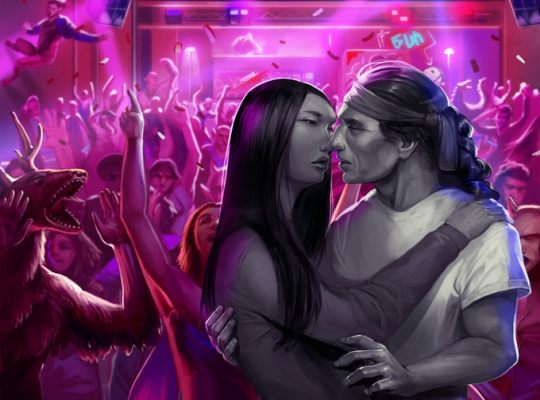
Hubs are also a flexible tool for structuring your campaign as a whole. You can use two different Hubs set in the same city for different campaigns, you can grab elements from any Hub to use as inspiration for your campaign, or you can expand your campaign to include new Hubs as your city grows. We’ll release new Hubs through this campaign as stretch goals and as digital supplements after the Kickstarter.
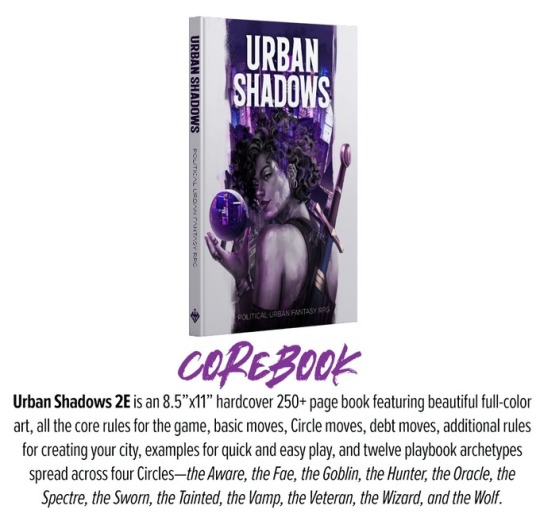
Kickstarter campaign ends: Thu, November 19 2020 9:00 PM UTC +00:00
Website: [Magpie Games] [facebook] [twitter]
50 notes
·
View notes
Text
“Sorry,” the anti-hero said simply, slender hands slipping from the white and black piano keys like they hadn’t wanted their guest to rouse that very moment. “Did my playing wake you?”
They looked to the top of the stairs, where the vigilante had padded over from the anti-hero’s bedroom to overlook the loft’s balcony. “I told you not to bring me here,” the vigilante said, a hint of annoyance crossing their voice. But they were careful about it. It was only a hint. They didn’t let too much frustration cloud their tone even while fidgeting at the leather cords wrapped around both wrists. A ten-foot-long cord, drawn tight, anchored them to the anti-hero’s bedpost.
“And leave you for dead?” the anti-hero quipped, getting up and closing the fallboard. They then took the stairs two, three steps at a time, stopping promptly to peer into the vigilante’s upturned face. Hovering just at their elbow. “Not a chance.”
“I can’t be here, you know that,” they spat. “This is an unsecured location in the heart of the city. You’re practically in the warden’s backyard. Bluecoats will be canvassing the neighborhood looking for me after what happened. It’s a death sentence if I’m caught.”
“You’re safe here.”
“Am I?” they asked raising their bound hands. The anti-hero smiled. They had done it as a precautionary, really. Restraining, but innocuously so, they made sure of it. After all, they didn’t want to hurt their deft little vigilante. They just wanted to keep them grounded for the moment.
They shrugged, “If you behave yourself.”
“And if I don’t.”
The anti-hero blinked, looking them over, taking in their seedy, disheveled features. The mess of their hair, the flush of their cheeks, the splash of freckles and chapped lips which they’d whittled at with their teeth in nervous anticipation. They’d predicted that response, dreamed of it really. It was the reason why they liked this particular vigilante. All spitfire and hell to pay. Damn the consequences. Damn the rules that were always tipped in the politician's favor. Damn their safety if it meant government reform, and citizens no longer under their oppressive thumb. They were a means to an end kind of fighter, within reason of course. The vigilante had morals. Standards. But, oh, with the anti-hero’s help, they could be so more.
The anti-hero could draw them out. Make them forget for once the ethical boundaries they set for themselves. Make them forget to play fair.
The anti-hero reached out, skimming fingers over the hollow of their cheek, relishing the tiniest hint of a shiver before running their thumb over the torn flesh of their lips. They tsked.
The vigilante’s frown deepened at the touch. Looking apprehensive. Shaken. The veneer of a warrior for the people began chipping away, and the anti-hero was starting to see through those cracks, to the soft core beneath. “You will,” the anti-hero replied decisively, after a pause.
“Don’t touch me,” the vigilante muttered, breaking eye contact, pulling away. They scampered backward, unknowingly towards the bed that had left a short time before. They were still disoriented. Fatigued from the fight, and from the wound in their side that the anti-hero had treated. “This is serious. I’m not going to be toyed with for your amusement.”
The anti-hero wasn’t sure if they knew that the loft was all one room, and that it was where the stairs they had just come from led to. There was nowhere to go really. Not when the vigilante was tethered to their bed. Still, the anti-hero followed, nonchalantly, with hands in their pockets, like a curious carnivore stalking a stranger in their territory.
“I’m not just doing this for my amusement,” they said, hubris pulling at the corners of their mouth. They flashed another smile, shining teeth, and subtle dimples. It was dimmer in the bedroom. The curtains drawn on the lone window. The light from the main living area was becoming faint. “You’re hurt, for one. And I do believe I mentioned saving your life for another. Isn’t there a code or something that says that you owe me?”
“I guess,” the vigilante replied stiffly, as they took one step after another in retreat. Determined to keep a wide distance between the two, yet still with the appearance of indifference. Biting their lip was a tell. “I do owe you a thank you. So…thank you.”
“I was thinking of something more than that.”
They lifted their chin, “Then you shouldn’t have rescued me. You should have respected my wishes and left me to die when I told you to get out. That’s your fault, not mine. I didn’t ask for you to step in. I didn’t ask for you to bring me here. You can’t just ignore people’s requests—their boundaries—when it doesn’t suit you.”
“Can I at least know your name for my troubles?”
“No.”
“I’ve seen your face. What’s in a name?”
“Fine then. It’s Noneya,” the vigilante gritted out, leveling them with a look. “As in noneya business.”
The anti-hero chuckled at their childishness. It was unexpected from their serious disposition earlier. “Cute.”
Another step and the back of the vigilante’s knees hit the edge of the bed. They tipped backward with a grunt of alarm, landing gingerly but prone. The vigilante struggled to get up, trying to push themselves up on their elbow and rollover. But anti-hero was on them, up on the bed, settling both knees on either side of the vigilante’s thighs, leaning over them, grabbing those bound wrists and stretching their arms above their head. They could see the panic that lit up their features, their eyes widening exponentially.
“While I admire your bravado,” the anti-hero said, slowly, capturing the vigilante’s chin. “We both know ‘thank you’s don’t make the world go round. And that your little war on injustice desperately needs an… inspirational awakening.”
“Don’t do this,” they said in warning with stilled, shortened breathes. “You’re not a villain. I’ve seen you in fights. I’ve seen you go up against the warden just as I have. You act like you don’t have a moral code, but I know you do. Remember,” they licked their lips. “Remember my boundaries.”
“Funny,” they said, as if the thought just dawned on them. “I was always really bad with boundaries.”
36 notes
·
View notes
Photo

Black Bolt #4 Review
spoilers spoilers spoilers spoilers spoilers spoilers spoilers spoilers spoilers
Another fantastic installment from the creative team of writer, Saladin Ahmed, and artist, Christian Ward, that switches narrative gears for a truly remarkable character study of Crusher ‘The Absorbing Man’ Creel. Full recap and review following the hump.
Black Bolt and his allies’ effort to break free from this bizarre cosmic prison that has confined them has resulted in failure. Regaining his powers, Black Bolt had seemingly destroyed the mysterious Jailer. Yet it turned out that Black Bolt had merely defeated the Jailer’s physical avatar. Who, or rather what, this Jailer is turned out to be a macabre collection of organs, tissue and brain matter, collected in chambers and acting in concert to exert an incredible level of telepathic power. This power was ultimately able to restrain Black Bolt and his colleagues and now BB and Crusher Creel find themselves bound in chains in some sort of chamber.

Their powers have once more been turned off, preventing them from being able to break free. And once more the Jailer’s gruesome, disembodied voice commands them be silent and repent in death. There seems to be something of a harsher edge to the Jailer’s voice… something that leads Crusher to believe that the Jailer is looking to kill the two of them once more, this time for good.
A piercing alarm fills the room and Crusher notices a gage near the corner, its dial slowly turning downward. It doesn’t take long for the two of them to realize that the chamber is being vacuumed, all of its oxygen sucked out. It will not be long before the two are suffocated.

Desperate, Black Bolt attempts to free himself from the chains. He recalls the lessons he had learned from his cousin, Karnak; lessons about sensing and exploiting the flaw in all things. He identifies a small fissure in one of the chain links and uses all of his strength to contort his muscles in such a way to crack the fissure and break the chain…

...but it is to no avail. Black Bolt simply isn’t strong enough.
Crusher continues to prattle on and BB chastises him not to speak. Talking consumes too much oxygen and only hastens what little time they have left. Yet there really is no need. Black Bolt has lived his life in silence, there is no need to die silent as well. He changes his mind and invites Crusher to talk to his heart’s content.

Crusher then proceeds to tell his life story. It’s a tale that filled with many of the same clichéd follies of your typical comic book goons, and yet the way he tells the story, the authentic voice Ahmed’s script offers Crusher makes it feel anything but cliché… it feels real, sympathetic, guilty while unapologetic.

Crusher’s mother made him feel like anything was possible, that he could rise up from his humble beginnings and achieve anything. Yet she died when Crusher was just a boy, leaving him in the care of his abusive father. His dad lorded over and abused Crusher up through his adolescence, ending only when Crusher learned the fight back.

And as soon as his father realized he could no longer bully his son, Crusher was thrown out and forced to fend on his own. Homeless, Crusher fell in with a bad crowd. His respite was using his skill with his fists to become an accomplished boxer. He did quite well on the boxing circuit, not only because he was fast, strong and knew how to throw a punch, but because he was so menacing in his appearance that his opponents were so frightened that they had all but lost a match before it had begun.

Crusher’s knack for menace earned him the attention of the organized crime element in his neighborhood (in particular, the mobster villain known as The Owl (an old foe from the pages of Daredevil)). The Owl recruited Crusher as an enforcer, bending arms and breaking noses to maintain the mob’s various protection rackets.
It wasn't long before he ends up incarcerated and his life takes a drastic change when he is listed in his prison cell by Loki the Norse God of Mischief. Loki was merely looking for a new means of bedeviling his hated brother, Thor, and he offered Crusher a magical formula that allowed his body to take on the atomic properties of any substance he touches, tremendously enhancing his strength, durability and capabilities as a combatant.

Newly dubbed ‘The Absorbing Man,’ Creel was even able to defeat Thor on one occasion, yet it wasn’t long before Thor rallied and bested him.

Thus began Crusher’s long and storied career as a super villain, tussling with costumed heroes, delivering beat downs and getting beat down himself. Crusher spent more time behind bars than he did as a free man, but he seemed content with he lot life had dealt him. Then once more his life took a drastic turn. During the first Secret War event, when various heroes and villains were swept off to Battleworld to duke it out for The Beyonder’s amusement, Crusher met the love of his life. Her name is Mary, but anyone who wants to keep their teeth straight knows better to refer to her by the name Titania.

It was love at first sight for them both. Even after the Secret war had ended, the two did everything together. They were in love and happy, even considered having a child together, but that never panned out. For the first time since the death of his mother, Crusher had something he was actually worried about losing. It made life heavier, but also much more worth living. And now here he is, lightyears from earth, dying of asphyxiation, his Mary likely to left forever not knowing what had become of him.
Crusher’s tale is periodically interrupted by questions and comments from Black Bolt. And the things BB has to say sheds further light on all of what has happened has shaped him as well. Black Bolt’s own character is further developed by way of the juxtaposition between him and Crusher… just how different the two are, as well as just how similar.

The portrait of The Absorbing Man that Ahmed and Ward paint is remarkably devoid of machismo. For all of his strength and bluster and tough talk, Crusher is notably open with his feelings and at ease expressing his vulnerabilities. He makes no effort to repress his sadness over the death of his mother, admits freely to crying when he was first incarcerated; he speaks about Titania like someone completely unafraid of being in love. Of course it’s not that he’s some noble soul… he’s done a lot of rotten things and owes up to this completely and unapologetically. He’s hurt a lot of people and even feels bad about it, but he doesn’t blame it on his circumstances, his mother’s death nor his father’s abuse. He owns his misdeeds as his own, but is not going to writhe in guilt over any of it, because, really, what would that achieve?

All of it poses Crusher as the perfect foil for Black Bolt. Black Bolt is noble and, in his own way heroic, but he is also repressed, and stoic and withholding; and his pursuit of fulfilling what he has viewed as his duty has cost him everything that he held dear. Crusher is far from noble… he is a villain, he has no sense of duty… yet he’s open and expressive, in touch with his feelings. He doesn’t brood over his losses but instead allows himself satisfaction in the simple pleasures of life, like cooking (or knocking over an armored car). Crusher possesses a kind of strength that is absolutely foreign to Black Bolt… a type of strength that BB is likely going to have to develop if he for himself is ever to earn back all that he has lost.
The one matter omitted from Crusher’s story is his son, Jerry. Jerry Sledge or ‘Stonewall’ was introduced in the pages of the first iteration of Secret Warriors. Therein it was revealed that Jerry was the product of his mother’s having been raped by Crusher. As a teenager, Jerry confronted his father and somehow physical contact between the two caused Jerry to gain the same absorbing powers as his father.

I’m guessing that Ahmed and Ward are simply unaware of Jerry’s existence. The idea that Crusher has a son that he’s neglected and, more so, that he’s a rapist kind of undermines the whole dynamic of Crusher and Black Bolt representing these two different but still equal types of strengths. And I wouldn’t be surprised if editor Will Moss just decided to let the matter slide because the script as it was is just so good. For those who see comic continuity as super important, Jerry’s omission sort of ruins Crusher’s story and reframes him as a hypocrite. For those who can let continuity slips go (and I guess I fall onto that side of the equation), the tale is just wonderfully stirring… heartbreaking but also satisfying.
Anyways, at the end of the issue, just when it appears that all is lost and the last of the air is dissipating from the room leaving BB and Crusher to perish, Lockjaw makes his triumphant debut.

The teleporting pooch has finally tracked his master down and has arrived for a last moment rescue. Black Bolt is overjoyed to see him. Never before has BB been able to say out loud that his dutiful dog is a ‘good boy’ and he doesn’t waste this rare opportunity, letting Lockjaw know how happy he is to see him. Lockjaw is indeed a good boy, but he is just a dog and as a dog he makes decisions quickly… He teleports Black Bolt and himself away in an instant, leaving Crusher behind. And the issue ends with Crusher abandoned, left alone as the air and light fade from the room. His fate left unresolved by a particularly piercing panel reading: ‘to be continued.’

Hats off to Mr. Ahmed on this one. I would never in a million years conceive of pairing together Black Bolt and The Absorbing Man… but this odd couple of a team-up works just perfectly, both enhancing Black Bolt’s evolving character as well as endearing me to Crusher Creel in a way I never thought possible.
Christian Ward’s art once again excels at bringing the script to life. The tone of this fourth issue is quite different that the three that proceeded it and Ward’s art adjusts accordingly. Ward’s style is so well suited for far out cosmic settings, yet he smartly tones it down to match the more somber, interpersonal tenner of the story. It’s only when Crusher and Black Bolt are discussing the loves of their lives, Titania and Medusa that Ward cuts loose with augmented flare; and it acts to hammer home just how important and magical these two women are to BB and Crusher.

Again, Ward does great work relaying emotion with the minimal line-work of the character’s faces. The somber tale is peppered with a number of really funny moments and the humor is very well punctuated by expressions on Crusher’s face.

Of course I realize I am gushing, but this issue really is that good. An absolute must read. Five out of five Lockjaws!

9 notes
·
View notes